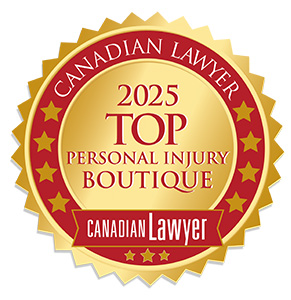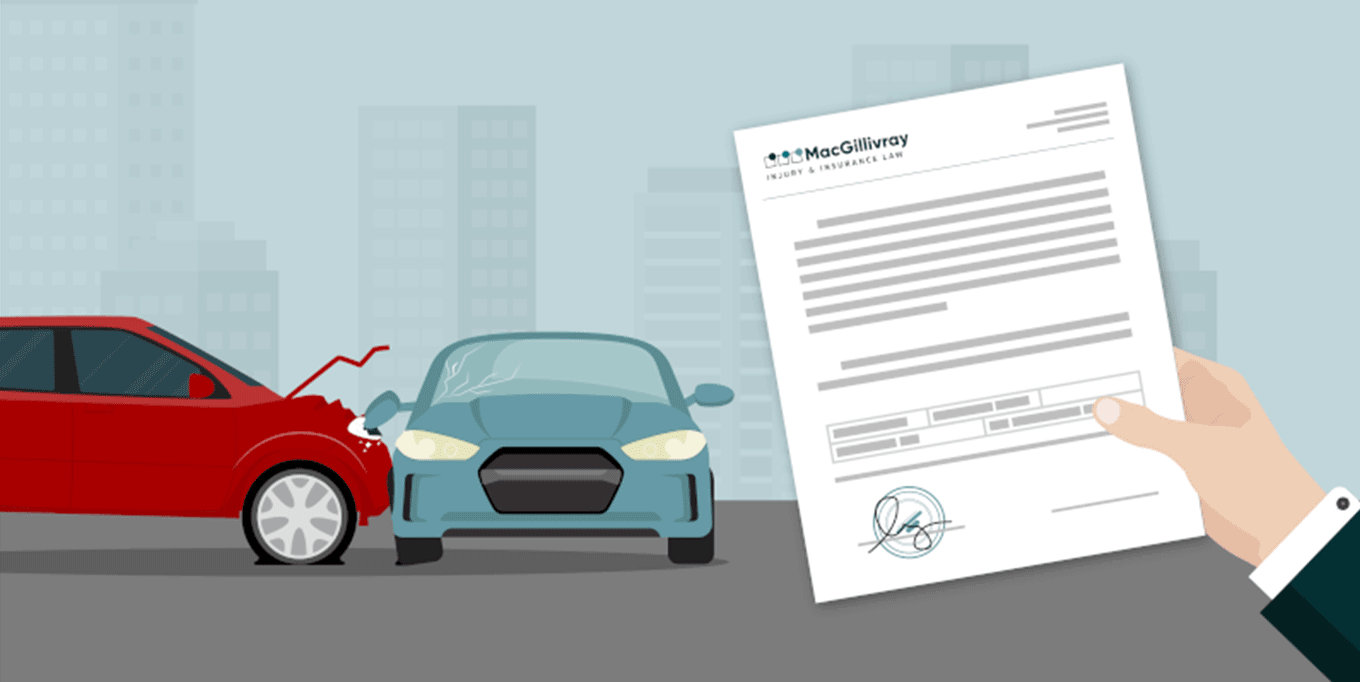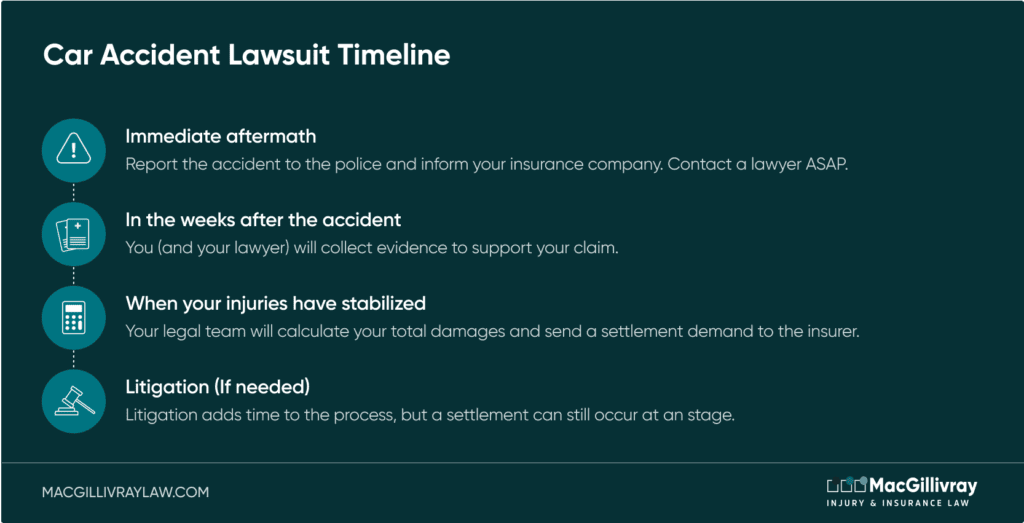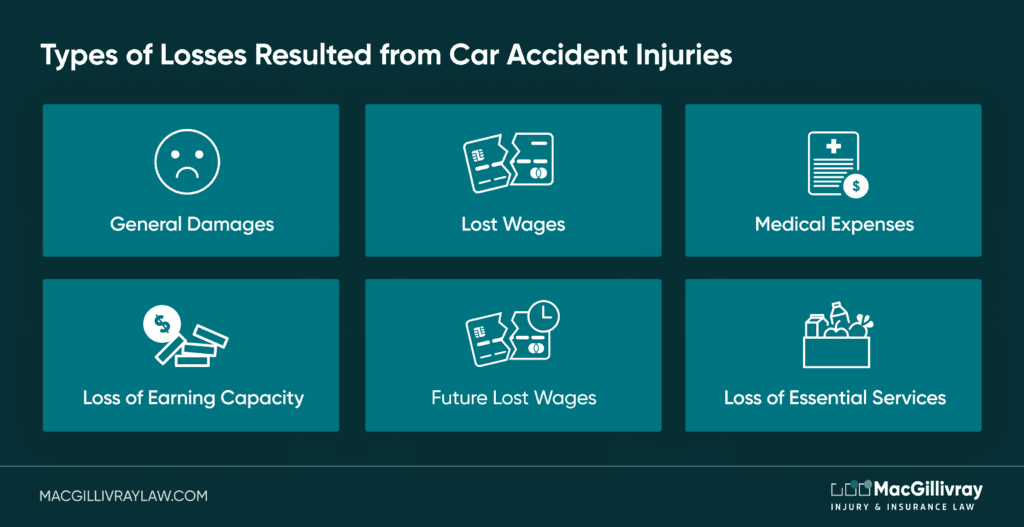




According to the RCMP, Nova Scotia observed a significant rise in catastrophic motor vehicle accidents in 2024.
As you navigate life after your accident, dealing with insurance companies, recovery, and returning to work can feel overwhelming. Seeking legal advice early from car accident lawyer in Halifax is one way people injured in car accidents can ensure they receive the compensation they are entitled to.
At MacGillivray Injury Law, our experienced personal injury lawyers take on the legal fight, giving you the time and peace of mind to focus on your recovery.
What to Do After a Car Accident in Halifax, Nova Scotia
After a car accident in Halifax, your first priority is safety. Once everyone is out of danger, take the following steps to protect your health, your rights, and any potential insurance claim:
- Ensure safety and call for help: Check for injuries and call 911 if anyone is hurt or the scene is unsafe. If possible, move vehicles out of traffic and turn on hazard lights to prevent further accidents.
- Exchange information: Trade contact and insurance details with the other driver(s) involved, including names, phone numbers, license plate numbers, and insurance policy numbers. This information is crucial for filing insurance claims.
- Gather evidence: If you can, take photos of the vehicles, the overall scene, and any visible injuries. Note the time, location, and road conditions. If there are witnesses, get their names and contact info. These details can help establish what happened and who was at fault.
- Report the accident to police: In Halifax, accidents that cause any injury or over $2,000 in property damage must be reported to law enforcement. Even for minor fender-benders, it’s wise to have a police report for an official, unbiased record of the incident.
- Notify your insurance company: Contact your auto insurer as soon as possible to report the collision. Provide them with the basic facts. Prompt notification is often required by insurance policies and it ensures you can access benefits like vehicle repairs and medical coverage.
- Seek medical attention: See a doctor as soon as you can, even if you feel fine. Some car accident injuries (like whiplash or concussions) may not show symptoms right away. A medical exam protects your health and creates a record of any injuries in case you pursue a claim.
The moments after a crash can be overwhelming, but following these steps will help protect you both medically and legally. If you’re unsure about the next steps or feeling stressed, our car accident lawyers are here to support you. Contact us for a free consultation.
Do I Need to Report the Accident in Halifax?
Should I Call the Police After a Motor Vehicle Accident?
In Halifax, you are legally required to report a car accident to the police if anyone is injured or if the property damage exceeds $2,000. This means that for most moderate or serious collisions – especially where people are hurt – calling the police is a must. The police will come to the scene, ensure safety, and create an official accident report.
If the accident is minor with no injuries and very little damage, you might not be legally required to call the police to the scene. However, it’s often still a good idea to report the accident even if it seems small. For one, damage estimates can be tricky – what looks minor could end up costing more than $2,000 in repairs. Also, some injuries (like whiplash or a mild concussion) might not be obvious immediately. Having a police report on file can protect you if medical issues or disputes about the accident arise later on. An official report serves as neutral documentation of what happened, which can be very helpful if you need to make an insurance claim or if the other driver’s story changes.
When and Why I Must Report a Car Accident to Your Insurance in Halifax
Besides reporting to the police, you also need to report the accident to your insurance company promptly. All insurance policies require you to notify them of an accident within a certain time frame. Even if the collision was minor and wasn’t your fault, let your insurer know what happened. Failing to report to your insurer could affect your coverage. When you report to the insurance company, just stick to the facts of what occurred.
In summary, report the accident to police whenever the law requires it or if you have any doubt about injuries or damage. It’s better to be safe and have the incident documented. And always inform your insurance provider as soon as possible. If you’re unclear about your obligations after a crash, or if the situation is complicated, our legal team can provide guidance. Contact us for a free consultation.
Suing after a car accident in Halifax, NS
Our team of top rated Halifax personal injury lawyers have been helping people across Nova Scotia involved in motor vehicle accidents receive fair compensation for their injuries for 30 years.
Insurance companies make money by paying out as little as possible in claims. The first offer made is not always the best, and the claim is often undervalued. While the legal process can take time, building a strong case and the threat of courtroom litigation can compel an insurance company to offer a fair settlement. In fact, most cases settle outside of court. Furthermore, an experienced personal injury lawyer will argue in your favour for eligible damages the insurance company may otherwise never acknowledge.
Our legal team will help you understand how motor vehicle insurance works, what the steps in the legal process are, and what kinds of benefits are available to you. And, if you’re not receiving the benefits you’re entitled to, then we will step in and fight for you.
We recommend speaking with an experienced personal injury lawyer who can provide you with information specific to your situation. Contact us today for a free consultation.
How long do I have to file a car accident lawsuit in Halifax?
Time is of the essence when you’ve been involved in a motor vehicle accident. Engaging a lawyer promptly after an accident helps ensure that evidence from the scene of the accident, witness statements, and other time-sensitive support for your case is preserved.
In general, you have two years from the date of the accident to file a motor vehicle accident claim in Nova Scotia, although there are exceptions. There are also other time limits that apply to no-fault claims under your Section B insurance.
If you wait too long, you may lose your right to sue the at-fault driver. We recommend that you engage an accident lawyer as soon as possible to secure your right to compensation.
Timeline of a Car Accident Claim in Halifax
Every car accident claim in Halifax is unique, but most follow similar stages to reach a resolution. Here’s an overview of a typical claim timeline:

- Immediate aftermath: In the first days after the crash, focus on your health and on notifying the proper parties. Get prompt medical treatment and follow your doctor’s advice. Report the accident to the police and inform your insurance company right away. This is also a good time to consult a personal injury lawyer so they can start protecting your rights and gathering evidence.
- Investigation and documentation: In the weeks after the accident, you (and your lawyer) will collect evidence to support your claim. This includes police reports, medical records, bills, and repair estimates. During this phase, you may receive benefits from your insurer (Section B accident benefits in Nova Scotia) to cover immediate medical expenses or lost income while you recover.
- Claim evaluation and negotiation: Once your injuries have stabilized and you have a clear picture of your prognosis, your legal team will calculate your total damages (medical costs, lost wages, pain and suffering, and other losses) and send a settlement demand to the at-fault driver’s insurer. Then, both sides negotiate. This phase may take a few months. Often, a fair settlement is reached during negotiations, and the claim is resolved without seeing a courtroom.
- Litigation (if needed): In Nova Scotia, you have up to 2 years from the accident to start a lawsuit. Litigation adds time to the process, but a settlement can still occur at any stage. Most cases settle before reaching trial. If a trial does happen, the court will decide the outcome and award compensation.
Overall, a car accident claim can resolve in a few months or take a few years, depending on factors like the complexity of the case and whether a lawsuit is required. Throughout this process, an experienced Halifax car accident lawyer will keep things on track and fight for your rights while you focus on recovery. Our team works to resolve claims efficiently while maximizing the compensation you receive. Contact us for a free consultation.
How much is my car accident injury worth?
A claim’s value is based on many factors. These factors fall into legal categories called “heads of damages” that set out the types of damages that may be recoverable in a lawsuit.

The severity of your injuries is a major factor in valuing your claim. Our clients’ injuries range in severity, from whiplash and soft-tissue injuries, to broken and fractured bones, to more severe injuries such as traumatic brain injuries, paraplegia and quadriplegia. We also help people who suffer from chronic pain and psychological injuries such as PTSD.
You can use our Injury Claim Calculator to learn more about how to evaluate your claim.
You may also have access to Section B insurance benefits following an accident. These benefits are paid by your own insurer in the event of a motor vehicle accident, and cover reasonable and necessary treatment costs, as well as some other associated costs, regardless of who is at fault for the accident.
When you’ve been injured in a car accident, Section B insurance provides up to $50,000 in coverage for medical and rehabilitation expenses, such as physiotherapy, massage, chiropractic, and nursing care. If you’re unable to work due to your accident injuries, Section B provides coverage towards your lost wages up to a maximum of $250 per week. If you’re unable to perform household duties due to your accident injuries, Section B insurance provides $100 per week in housekeeping benefits for up to 52 weeks. In the event of a death of a loved one, Section B provides up to $2,500 in funeral expenses and death benefits up to $25,000.
Like each person, each case is unique. The best way to learn the value of your claim is to contact an experienced personal injury lawyer who can ensure you receive fair compensation.
What If My Injuries Show Up Days or Weeks Later?
It’s not unusual for some car accident injuries to be felt only days or even weeks after the collision. In the immediate aftermath of an accident, adrenaline and shock can mask pain. Soft tissue injuries like whiplash, muscle strains, and even concussions might not fully develop symptoms until well after the crash. You might feel fine at first, only to wake up with pain in your neck or back a couple of days later.
If you notice injuries or pain days or weeks after your accident, take action right away. First, see a medical professional as soon as possible. Explain that you were in a car accident and describe all new symptoms, no matter how minor they seem. Getting prompt medical attention is important for your health and it creates a medical record linking your injuries to the accident. Follow your doctor’s advice for treatment and keep records of all diagnoses, treatments, and medical bills.
Next, inform your insurance company (and the at-fault driver’s insurer, if you’re already in the claims process) about the newly discovered injuries. Provide the updated medical information. If you’ve already started a claim, your compensation demand can be adjusted to include these additional injuries and their associated costs (like new medical appointments or more time off work). If you haven’t filed a claim yet, note that in Nova Scotia you generally have up to two years from the date of the accident to start an injury claim. Don’t delay once you realize you’re hurt, but know that a late-arising injury can still be compensated if it’s within the limitation period.
It’s also wise to be cautious about settling an insurance claim too quickly. Insurers sometimes offer a speedy settlement soon after an accident, but if you accept money and sign a release early on, you may give up your right to claim further compensation if other injuries surface later. This is one reason it can help to consult a personal injury lawyer before settling. Our car accident lawyers have worked on many cases where symptoms were delayed, and we know how to handle them so you’re treated fairly. Whenever your injuries appear, we can assist in pursuing the compensation you deserve. Contact us for a free consultation.
Common Questions About Accident Injuries
If you can’t find the answer you’re looking for on our website, send us a message.
- Should I accept the settlement my insurance company offers me?
- Do I have to make a statement to my insurance company?
- How is fault determined in a car accident?
- Can I sue if I was hurt by an uninsured driver?
- Can I sue if I was injured in a hit and run?
- Can I sue if a loved one was killed in a car accident?
- Can I sue if I was injured in an ATV, snowmobile, or boat accident?
What If the Other Driver Was Uninsured or Fled the Scene?
Being hit by an uninsured driver or the victim of a hit-and-run is frightening and frustrating. However, even if the at-fault driver has no insurance or cannot be found, you still have options for compensation in Halifax. Provincial law and standard auto insurance policies provide protections in these situations.
If the other driver is identified but has no insurance, you can make a claim through your own auto insurance under your “uninsured motorist” coverage (also called Section D in Nova Scotia). All vehicles in Halifax must have this coverage by law, which typically provides up to $500,000 for injuries and losses caused by an uninsured driver. Essentially, your own insurer steps into the shoes of the at-fault driver’s insurer and compensates you for things like medical bills, lost wages, and pain and suffering up to the coverage limits.
If you were the victim of a hit-and-run (the at-fault driver fled and isn’t identified), a similar process applies. You should report the accident to police immediately (within 24 hours) and notify your insurer as soon as possible. Your insurance company will handle the claim under the uninsured/unidentified driver provisions of your policy, treating it as if an uninsured driver caused your injuries
Uninsured and hit-and-run claims can be more complicated than a typical accident claim, so it’s wise to seek legal advice. Even though you’re dealing with your own insurer, remember that insurance companies often try to minimize payouts. An experienced personal injury lawyer can guide you through the extra steps and advocate for your right to full compensation. You still have avenues for financial recovery, even when the other driver can’t personally pay. Our team has successfully handled many uninsured and hit-and-run cases for clients. Contact us for a free consultation.
Can I sue if a loved one was killed in a car accident in Halifax?
Yes. In the case of a fatal car accident, a loved one’s right to compensation depends on their relationship to the deceased. If you’ve lost a family member in a car accident in Halifax resulting from another person’s negligence, you may be eligible for compensation. In Halifax, a spouse, common-law partner, parent, or child can pursue a claim for wrongful death under Section 5(1) of the Fatal Injuries Act.
How long do I have to file a wrongful death lawsuit in Nova Scotia?
In Nova Scotia, you must file a wrongful death claim within 12 months of the date of death. Speak with an experienced personal injury lawyer to determine your eligibility and ensure that your rights are protected. Learn more about fatal injury lawsuits.
Common types of collisions in Halifax
As a growing city, Halifax faces issues of traffic and congestion. We represent people who have been injured in many different types of motor vehicle collisions in Halifax, including:
- Head-on collisions
- Rear-end collisions
- Side swipes and collisions during a lane change
- T-bone collisions
- Collisions with objects or animals
- Hitting a parked car
- Run off the road by another vehicle
- Vehicle rollovers
- Being hit when turning left into traffic
- Cyclist accidents
- Pedestrian accidents
If you have been injured in an accident and need help determining who is at fault and what compensation you are entitled to, contact us for a free consultation. We serve clients throughout Halifax Regional Municipality from our Downtown office on Agricola St. We can also meet by phone or virtually.
Have questions for our team?
Frequently Asked Questions
- How can I help my personal injury lawsuit to get the best settlement?
- 7 steps to take after a car accident to help your injury claim
- How can a lawyer help with my personal injury claim?
- Can you sue a driver whose identity or insurance details are unknown?
- Is the parking lot 50/50 myth true?
- Can I sue if I was in a car accident at work in Nova Scotia?
- Can apologizing after an accident impact your claim?
- Am I covered by insurance if I was driving someone else’s car?
- Can I still sue if I wasn’t wearing a seatbelt?
- Can I sue my rideshare (Uber, Lyft) driver?
- What is whiplash?
What Our Clients Say...
Request a
Free Consultation
If you would like to learn your legal options at no obligation, contact us today to set up a free consultation.






